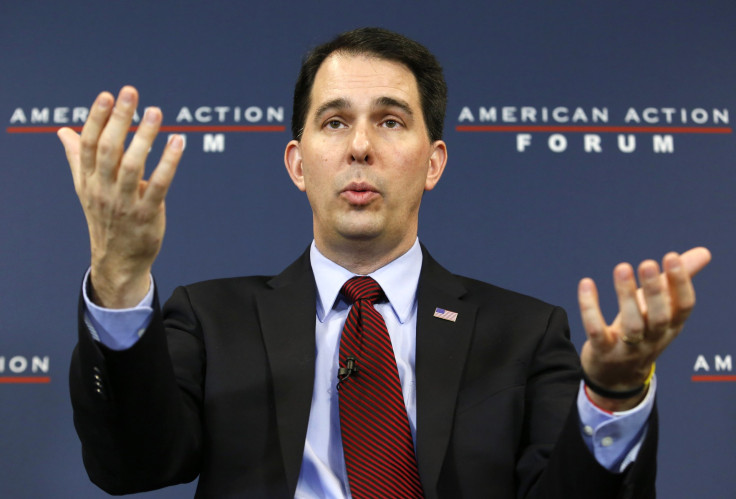National Governors Association Meeting: National Security Dominant Topic For Republican White House Hopefuls

For a handful of U.S. Republican governors gathering this weekend in Washington, D.C., for the winter meeting of the National Governors Association, emerging as a solid presidential contender is a top priority. They are using the bipartisan policy meeting to break from the crowded field of supposed White House hopefuls and establish credentials on a topic that state executives are widely seen to lack: national security.
With campaign donors and political strategists roaming the halls and rooms at the meeting venue, Govs. Scott Walker of Wisconsin, Chris Christie of New Jersey, Bobby Jindal of Louisiana and Mike Pence of Ohio are expected to participate in a handful of panels on domestic issues, including economic growth, development, education and labor. But as a number of terror-related crises rage in the Middle East, Ukraine and North Africa, the governors can use private conversations in the hallways and a Sunday roundtable on homeland security to sell their positions on national security.
Establishing national security credentials ahead of the next presidential-campaign cycle is more important this year and also more complicated, said John Weingart, director of the Center on the American Governor in the Eagleton Institute of Politics at Rutgers University in New Jersey. “There’s more to learn,” he said. “It’s not about just getting briefed about the Middle East, or Iraq, or Latin America; there are so many parts of the world where there are visible conflicts and questions about what the United States’ role should be.”
No matter who comes out on top and goes on to win the party’s nomination, they will potentially face down Democratic hopeful Hillary Clinton, who, during her four years as the U.S. Secretary of State, logged more than 950,000 air miles and visited 112 countries as the nation’s foreign policy official. Republican hopefuls will likely seek to minimize her experience by linking her to President Barack Obama’s unpopular foreign policy record. A CNN/ORC poll released Tuesday found that 57 percent of Americans disapproved of Obama’s handling of the fight against ISIS and 54 disapproved as his handling of terrorism overall.
Michael O’Hanlon, co-director with the Center for 21st Century Security and intelligence at the conservative Brookings Institution, a Washington-based policy think-tank, said Clinton shouldn’t rest on her laurels to edge out the Republican challenger. “She has to have good ideas, not just a good resume,” he said.
With Obama tanking in the polls, Republican White House hopefuls are eager to stand out by touting themselves as strong on national security. Walker recently told CNBC’s Squawk Box television program that the threat assessments he receives as governor worry him. "Whether it's special ops or other engagements out there, we've got to be prepared to do what it takes to keep America safe," Walker said.
Christie took a similar tack, but he aimed his remarks at the president. “You see the president taking bows, saying he has terrorism on the run, yet ISIS is beheading people and burning foreign soldiers alive," said Christie, the chair of the Republican Governors Association, at an event in the early-voting primary state of Iowa earlier this month.
Jindal also hasn't shied away from any opportunity to slam Obama. "The president refuses to own up to the challenges we face. He is letting this threat fester and it’s metastasizing by the day,” Jindal said earlier this month.
Former Florida Gov. Jeb Bush, who has been seen courting support for a presidential run, gave a speech Wednesday to the Chicago Council on Global Affairs in which he expressed his views on America’s role in the world, according to an NBC News report. He said the U.S. needs a plan to address the threats by ISIS, al Qaeda, Boko Haram and the Taliban. "Everywhere you look, you see the world slipping out of control," Bush said.
All but one of the last five presidents have been state governors. But some Washington insiders have challenged the notion that the best nominee is someone with gubernatorial experience.
"The next president of the United States needs to be someone who has a clear view of what's happening in the world, a clear strategic vision of America's role in it, and a clear tactical plan for how to engage America in global affairs," Florida Sen. Marco Rubio, a likely contender for the 2016 GOP presidential nomination, said last month, according to a National Journal report. "And I think for governors, that's going to be a challenge initially because they don't deal with foreign policy on a daily basis."
Two-term former Pennsylvania Sen. Rick Santorum, another likely White House contender, made similar remarks to Fox News host Megyn Kelly last month. "I don't know too many governors with national security experience... I was eight years on the Armed Services Committee, passed major pieces of legislation, both dealing with Syria and Iran, when I was in the United States Senate," Santorum said. "I think...knowing and understanding how the military operates, knowing and working on foreign issues for a long time, particularly since 9/11, is a very important credential."
The National Governors Association weekend will include plenty of opportunities for Christie, Walker, Pence and Jindal to defend their experience. The gathering includes private events featuring "a lot of significant donors who are worth courting for anyone who has presidential aspirations," Fred Malek, a high-profile GOP fundraiser, told the Associated Press.
With such a crowded scheduled, not every hopeful will be able to stand out from the pack. “These meetings do tend to be useful — but not necessarily for vetting a whole class of would-be presidential candidates,” said O’Hanlon. “In the end, the question here is not about proving the general concept that governors can be good presidents, but figuring out whether a single person has the bona fides. A group meeting can’t really do that.”
© Copyright IBTimes 2025. All rights reserved.






















